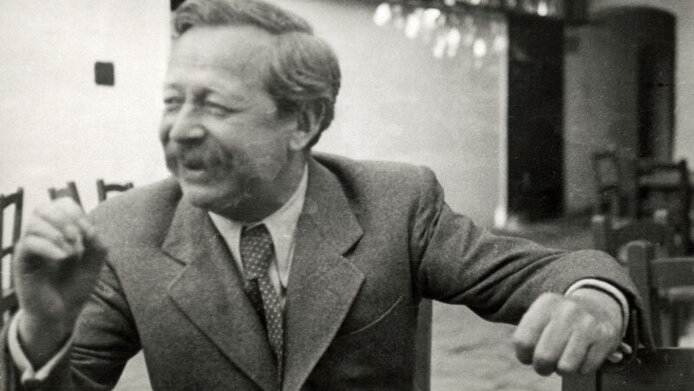A journalist of European stature

Not all writers are remembered the way they deserve to be. If you mentioned the name Karl Tschuppik to people who happen not to be experts on journalism in the interwar period, you would probably be met with blank stares. Yet he was an Austrian writer of European stature: From 1910 onwards, he provided political commentary in Prague, Vienna and Berlin for more than 20 years and under three different political systems. Throughout, he was a consistent proponent of democracy, and spoke out against nationalism and small-mindedness. The mission of a project funded by the Austrian Science Fund FWF is to make the work of this unfairly forgotten firebrand accessible in an annotated edition.
The driving force behind the project is literary scholar Walter Schübler of the University of Salzburg. With a journalist like Karl Tschuppik, whose work is scattered across dozens of imprints, the first step is doing a lot of research. “It means toiling away, figuratively speaking,” says Schübler, referring to systematic leafing, scrolling and clicking. “Leafing through newspapers, scrolling through microfiche, and clicking through digital archives.” Not only is Karl Tschuppik’s work spread across some 90 newspapers, journals and magazines. He also wrote under nearly two dozen pseudonyms and sobriquets. The project has gathered some 2,900 texts so far, with another 60 having surfaced only recently. The bibliography continues to be compiled, but at the moment, the main concern is digitising and organising the texts. Then texts must be selected for the study edition that is intended to make the journalist’s work accessible both to the scientific community and to interested laypersons. “The focus will be on Karl Tschuppik as a political commentator,” says Schübler. Once the selection has been made, it has to be annotated as well.
The perspective of a clear-sighted liberal
“What defines Karl Tschuppik is that even as an editorialist, he was never aloof,” Walter Schübler explains. “He consistently wrote from a citizen’s perspective and spoke out decisively against anything that would restrict civil liberties.” In terms of political alignment, Karl Tschuppik had started out on the far left and then moved gradually towards the centre. However, his views on social policy had always been liberal. “It was important to Karl Tschuppik to defend the standards of civilisation he understood to make up the concept of Europe.” As a consequence, the writer found himself on the Nazis’ first blacklist of “harmful and undesirable writings” in 1933. His works were considered likely “to dissipate the nature and race of the German national order, to negate the force and significance of great leaders in favour of the masses through egalitarianism, and to sully their greatness”.
Circles in Prague launch intrigues
Karl Tschuppik lived in hotels year-round, which is why he left little to posterity, save for his texts and some correspondence. What we know of his life are mainly the key dates and the milestones of his career. He was born in 1876 in the Bohemian town of Mělník with a German national background. In the late 19th century, he began writing for the Prague daily Prager Tagblatt, and went on to become its editor-in-chief in 1910. “From that point on, Karl Tschuppik began to emerge as a political commentator,” says Walter Schübler. He turned the Prager Tagblatt into the monarchy’s major liberal daily. In 1917, he was stripped of his post, after chauvinistic circles in Prague had launched intrigues against him. Karl Tschuppik then moved to Vienna.
In 1923, he became editor-in-chief of Die Stunde, Austria’s first tabloid, and despite its sensationalist style, he positioned the daily as a staunchly pro-democratic voice against right-wing extremism. From the mid-1920s on, the number of his publications declined sharply. In 1926, he moved to Berlin and increasingly devoted his time to writing biographical tomes about the Habsburgs. He returned to Vienna in 1933, where he died in 1937.
From oblivion to canon
“The number of obituaries alone shows that Karl Tschuppik’s contemporaries unanimously felt his towering significance,” says Walter Schübler. Contrary to other writers of his time, he spent little time in coffee houses, preferring wine taverns. He had even stipulated in his last will and testament that tavern music was to be played at this funeral. And thus, people assembled at the cemetery in the Viennese suburb of Grinzing on 22 July 1937 and listened to the song “There will be wine, and we will be no more”. Thereafter, Karl Tschuppik fell into oblivion. In 1982, Klaus Amann published a collection of texts by Karl Tschuppik entitled “From Francis Joseph to Adolf Hitler”. In recent years, Walter Schübler has worked to shed more light on Karl Tschuppik’s life; now, his mission is to make the writer’s work accessible to the public. “A man like that should be known to this day,” as the biographer and literary scholar puts it.
Personal details
Walter Schübler completed a translation degree in Vienna and defended a dissertation on Rabelais. He works as a writer with a focus on biographies and lives in Vienna. From 2005 till 2018, Walter Schübler worked primarily on the life and oeuvre of Anton Kuh in the course of projects funded by the FWF. Since 2019, he has focused on the Austrian journalist Karl Tschuppik.
Publications
Bibiana Amon. Eine Spurensuche. Edition Atelier 2022
„Komteß Mizzi“. Eine Chronik aus dem Wien um 1900. Wallstein Verlag 2020
Anton Kuh, Biographie. Wallstein Verlag 2018





